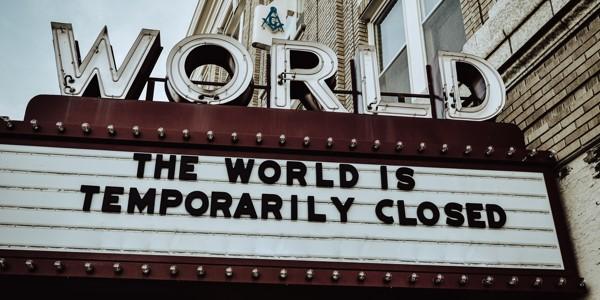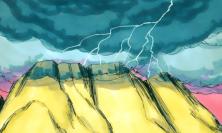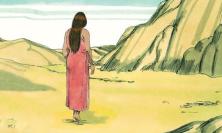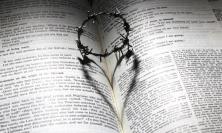It falls on all of us to ask how the extreme situation that we are living through can change us, individually and collectively, says Mauricio López Oropeza. Through this pandemic we are invited to a conversion in which we learn to embrace our fragility, interconnection and mystery, ‘just as in these Easter days the meaning of Jesus’s death and passion is a passage to the promised new life of the resurrection.’
In his iconic work, The Plague, Albert Camus addresses the depth and ambivalence of the human condition. His story is set in the context of an extreme experience in which existential questions come to the fore, just as is happening today. Science will reveal more to us about the reasons for the Covid-19 pandemic in due course, but it is left to all of us to ask now about our own existence in the midst of this crisis and the way in which we decide to act in it, as individuals and as a society.
What I consider to be the central proposal of Camus’ existential reflection, even though it was written in 1947, can still shake all of us in 2020 as it prompts us to ask how we stand before this pandemic and if we are capable of looking beyond it.
Yes, they had suffered together, in body no less than in soul, from a cruel leisure, exile without redress, thirst that was never slaked. Among the heaps of corpses, the clanging bells of ambulances, the warnings of what goes by the name of fate, among unremitting waves of fear and agonized revolt, the horror that such things could be, always a great voice had been ringing in the ears of these forlorn, panicked people, a voice calling them back to the land of their desire, a homeland. It lay outside the walls of the stifled, strangled town, in the fragrant brushwood of the hills, in the waves of the sea, under free skies, and in the custody of love. And it was to this, their lost home, toward happiness, they longed to return, turning their backs disgustedly on all else.
In a world where everything seemed to be within the grasp of our own human capabilities, developments and intelligence, with our technology that supports increasingly individualistic and alienating ways of life. In dominant societies that function under the premises of quasi-autonomy, self-determination and nationalisms. There, where apparently everything was under our control and superficial relations were enough to sustain our entire existence, in that precise moment of history, in the heart of that reality, a microscopic viral presence bursts in to transform everything, to disrupt everything, to question everything ... at least momentarily. This virus shows us our smallness. And it comes at a time when we have reached the limits of our planet's carrying capacity (ecological limits) and the obscenest levels of inequality.
We have no idea of the real implications that this pandemic will have, of how much it will redefine our lives. Each of our views is limited by our reduced understanding of the world according to our own definition of a more-or-less stable normality that will not return, at least in the short term. When it is so difficult to predict a material future with certainty, we find ourselves turning to more existential questioning of our deep identity. As we face these months and years to come, on which internal and external forces will we draw? How must we conduct ourselves as sons and daughters of this time with regards to ourselves and others? And in what sense can a mystery that transcends us sustain us on our journey?
Camus’ essential question on being is voiced by the character of a Jesuit priest, Paneloux. This priest, and his relationship with the plague of the novel’s title and those affected by it, shows us two pathways to respond to the Covid-19 pandemic.
In his first sermon, Fr Paneloux speaks to his congregation without associating himself with them. He begins by saying: ‘Calamity has come on you, my brethren, and, my brethren, you deserved it’. He experiences this situation as something apart from himself and as something that he is called to interpret without being transformed by it; he must dictate the course of action from a privileged, distant position, even one of power or superiority.
In this time of the Covid-19 pandemic we see political, religious and social leaders who, regardless of their ideology, have lost empathy with the pain in front of them and are acting from interests so fleeting or particular that their words fade along with their legitimacy as the pandemic advances. Unfortunately, we have too many examples of leaders who, out of incapacity, attachment to particular interests, fear or an inner void, dissociate themselves from the cries of the others.
‘If today the plague is in your midst, that is because the hour has struck for taking thought. The just man need have no fear, but the evildoer has good cause to tremble’. This notion of a divine punishment that Paneloux expresses finds echoes in the words of those who today try to make us forget the enormous structural inequalities, the prevailing untenable situation of poverty and injustice, and the predominance of the god of money. In order to seize and justify power for themselves, they turn a blind eye to these and instead manipulate the needs and beliefs of those they wish to control, placing the burden of guilt and failure on them. Paneloux again: ‘For a long while God gazed down on this town with eyes of compassion; but He grew weary of waiting, His eternal hope was too long deferred, and now He has turned His face away from us.’
In this pandemic, whose expansion is rapid and difficult to stop, this notion of blame and punishment must be definitively silenced. This global crisis is affecting everyone, and at the same time it is revealing the profound situation of inequality in which the virus most affects those whom God loves the most, those whom Christ himself called as the most beloved, the blessed.
After this crisis, each and every one of these leaders must be called to give an account of their failures when the world needed leaders who would be touched by the cries of the poor and the earth, and act accordingly.
The same character, Father Paneloux, experiences an inner rupture and a deep transformation as he witnesses the pain and senselessness of the death of the most vulnerable as a consequence of the plague. As a result of that personal experience of suffering, he presents us with a second way of responding.
In the face of the death of a child, of an innocent, everything changes. The story narrates the profound pain that this little boy suffers from the plague, stating that it was a true ‘scandal’ because,
… they had never had to witness over so long a period the death-throes of an innocent child … From between the inflamed eyelids big tears welled up and trickled down the sunken, leaden-hued cheeks. When the spasm had passed, utterly exhausted, tensing his thin legs and arms, on which, within forty-eight hours, the flesh had wasted to the bone, the child lay flat, racked on the tumbled bed, in a grotesque parody of crucifixion.
Like Paneloux in the face of this pandemic, we are called to look into the eyes of the most vulnerable, the many innocent people who are losing their lives. Taking refuge in a bubble will not change the fact that those dying will eventually challenge us asking, as this child asked Paneloux: what did we do in this situation?
It is true that today it is essential to take care of ourselves (to stay at home for those who have that privilege) in order to take care of others, but this stretch of our human history is a real watershed. Here a line is marked between before and after, and the grotesque, crucified victims of the pandemic invite us to embrace life in such a way that we will stand up and offer ourselves to the service of others when the time comes. A life of genuine alterity will be born, just as in these Easter days the meaning of Jesus’s death and passion is a passage to the promised new life of the Resurrection. Will it be possible for us to participate in a true Easter for our whole humanity, in which a new world could be born as the fruit of a great conversion?
Paneloux, before that innocent child about to die, experiences the same conversion to which we are being invited: ‘Paneloux gazed down at the small mouth, fouled with the sores of the plague and pouring out the angry death-cry that has sounded through the ages of mankind. He sank on his knees, and all present found it natural to hear him say in a voice hoarse but clearly audible across that nameless, never ending wail: My God, spare this child!’ Helplessness will continue to be a part of our lives, but if we are able to recognise the cry of all life in the unjust deaths of so many, we will be able to understand that our cry to God is for him to change us radically through this undesirable pandemic that is not a punishment, but a sign of the times, along with so many others that involve the death of the most vulnerable.
After this experience of conversion, Paneloux, ‘spoke in a gentler, more thoughtful tone than on the previous occasion, and several times was noticed to be stumbling over his words. A yet more noteworthy change was that instead of saying you, he now said we’. He himself had moved from the place of the judge or interpreter, to the very place of those who suffered from the pain of the plague.
In this second sermon he encouraged his hearers to discern the meaning within even their horrendous situation: ‘we might try to explain the phenomenon of the plague, but, above all, should learn what it had to teach us … there were some things we could grasp as touching God, and others we could not’. How much good it does us to see ourselves vulnerable and without all the answers, since in this way all the supposed absolute truths about God held tightly in the hands of some, excluding others, fail as they slip through the fingers, opening some space for mystery.
So what does all this teach us about the profound changes that our world needs to embrace in order to face the uncertain tomorrow with hopeful eyes? There are attitudes that we must eradicate completely in our personal, communal and societal structures, because they are inequitable, self-centred and individualising, destructive, false and unsustainable; and we can also identify new pathways that will lead to a new humanity: a more incarnated humanity, in communion with pain and hope, in a process of permanent conversion, and in a transcendental search above the material.
Paneloux, redeemed by the encounter with the concrete pain of his neighbours, which he lived as his own pain, says: ‘My brothers, a time of testing has come for us all. We must believe everything or deny everything. And who among you, I ask, would dare to deny everything?’ This pandemic calls for a capacity for transcendence necessarily anchored in a sense of mystery and in the embrace of otherness. Otherwise, we will commit the same mistake of pretending to be in control of everything, until a new pandemic, or the imminent climate catastrophe, reaches us.
Pope Francis, too, recently expressed this desire for change:
Today I believe we have to slow down our rate of production and consumption (Laudato Si’, §191) and to learn to understand and contemplate the natural world. We need to reconnect with our real surroundings. This is the opportunity for conversion... What we are living now is a place of metanoia (conversion), and we have the chance to begin. So let’s not let it slip from us, and let’s move ahead.[i]
The path to the new, already blossoming in the midst of this crisis, will be held up on three legs of a tripod:
1. Awareness of our own fragility and finiteness as a starting point, so that we create and recreate the new from our limited being. Many cultures and traditions can show us how to turn our backs on societies centered on consumption and unlimited accumulation, on market economies that swallow up human beings, and on a vision of an unlimited planet that we must destroy. We must end the ‘throw-away culture’ in order to weave a culture of sobriety and solidarity, which will arise from the awareness of our own fragility.
2. Awareness of our undeniable interconnection. Never before has society realised that we are absolutely intertwined. A tiny virus has shaken us from the illusion that each one of us is enough for him- or herself, or that I can remain isolated without taking responsibility for the consequences of my acts (or omissions) with respect to the lives of others. Nature has always cried at us, trying to communicate this interrelationship and the fragile balance in ecosystems. The potential new post-Covid-19 society will have to be sustained by existential ties that allow us to rethink all relationships, institutions and structures, otherwise we will again be at the mercy of the next pandemic, even more fragile in our capacity for resilience.
3. Awareness of mystery as the energy that sustains everything. No one can save him- or herself, and in the darkness of these days the most essential search of many is for a profound encounter. Beyond the particular religions, embracing all of what is positive and valuable in each one of them, we are called to create new conditions for a planetary spirituality rooted in communion, co-responsibility, otherness and the capacity of contemplation of God´s presence in all.
Towards the end of his work Camus offers us a final lesson: ‘Yes, the plague had ended with the terror, and those passionately straining arms told what it had meant: exile and deprivation in the profoundest meaning of the words’. If we are to learn such a lesson, we must let the new understandings of these words that we have gained as a result of this pandemic shape the new world that we must create.
Mauricio López Oropeza is Executive Secretary of REPAM.
- Read Gemma Simmonds CJ's reflection on The Plague >>
[i] Austen Ivereigh, 'Pope Francis says pandemic can be a "place of conversion"', The Tablet (8 April 2020): https://www.thetablet.co.uk/features/2/17845/pope-francis-says-pandemic-can-be-a-place-of-conversion-






